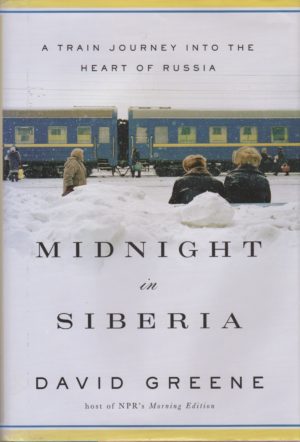
Midnight in Siberia by David Greene (2014. Norton. ISBN 978-0-393-23955-9)
Timely. That’s the word that comes to mind as I type this short review of NPR anchor David Greene’s fascinating look at post-communist Russia from the windows of the legendary Trans-Siberian Railroad. This morning I awoke to the news that it is possible that the newly annointed Attorney General of the United States lied, or at least, mislead members of the Senate (including Minnesota’s own Al Franken) when asked if he had knowledge of any direct contacts between Team Trump and the Russian government during the 2016 campaign. Sessions said “No” and that may turn out to be, at best, a misstatement, or at worst, a falsehood. Set against the backdrop of the current state of affairs depicted in Greene’s travelogue-turned-political-primer, where the majority of Russian common folk seem impossibly wedded to the notion that, while Vladimir Putin might be a bad man, he is, at the very heart of his core, a Russian. And that, apparently, is enough.
This is a fairly easy, breezy read. Greene doesn’t go deep into the weeds of the new Russian reality. He makes his case directly and succinctly through reportage of his conversations with ordinary Russians he meets (and previously met) during the train ride and from his home base as the Russian Bureau Chief for NPR in Moscow. He makes a steady and fairly deliberate attempt to educate American readers on this simple point: Russia is not now, and may never be, ready for Western style democracy. The heritage of the Russian empire and its people is the need for a strong man (or in the case of Catherine the Great, a strong woman) like Putin to lead them. Sure, there are sophisticates and intellectuals in the larger cities whose protests concerning Putin’s brutal crackdowns against the press, gays, free speech, and the like make international news. But Greene makes a cogent case that, for the most part, though Russians who are not of the privileged class (the oligarchs and their cronies who prop at Putin at the risk of losing their status and wealth) understand they are getting a raw deal in many ways in terms of economic equality and individual rights, the average Russian citizen is happy enough with his or her lot, or at least, willing to tolerate such slights in exchange for relative peace and stability.
This is not great literature. The book’s prose is nowhere as eloquent as that of say, Paul Theroux, one of the world’s most gifted travel writers and observers of divergent culture. But, as stated, given who is now leading our fair nation and the aspersions of connections between Trumpism and the bare chested horseman, it’s a book that should be required reading for all Americans.
4 stars out of 5.
Peace.
Mark


